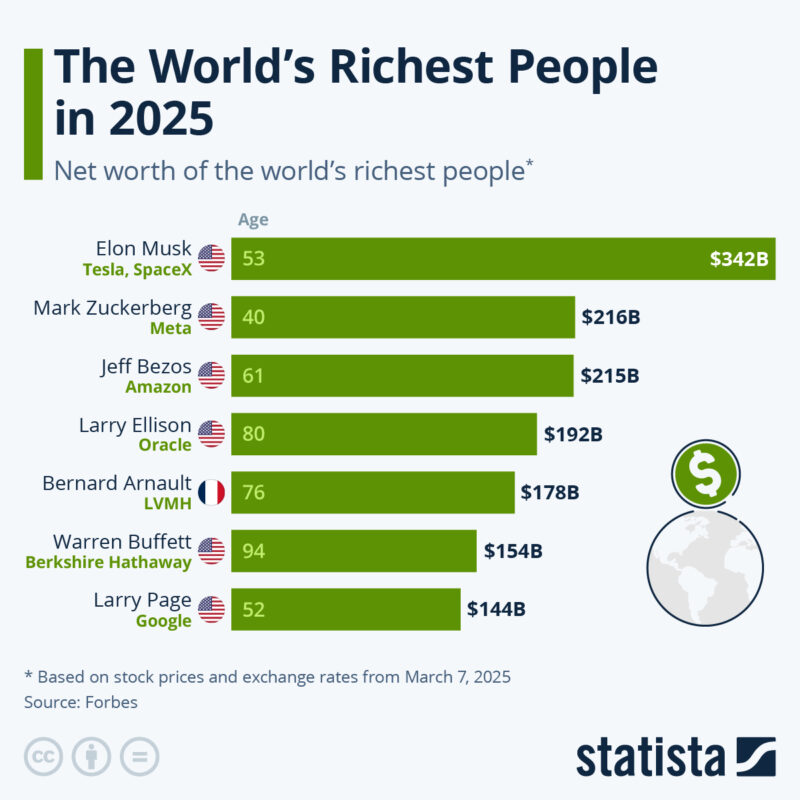Blog
How Many Billionaires Are There in the United States?

How Many Billionaires in USA :- The United States has long been recognized as the land of opportunity, where ambition, innovation, and entrepreneurship can lead to immense wealth. Today, it is also the global leader in billionaire wealth, boasting more billionaires than any other country in the world. From tech pioneers like Elon Musk and Mark Zuckerberg to retail giants like Jeff Bezos, American billionaires are shaping not just the economy but also culture, politics, and philanthropy.
In recent years, the number of billionaires in America has continued to grow, reflecting the nation’s dominance in technology, finance, and innovation. At the same time, this concentration of wealth has sparked debates about inequality, fairness, and the future of capitalism. Understanding how many billionaires the U.S. has—and the trends behind their rise—offers insight into the broader economic forces shaping society today.
A Snapshot: Current U.S. Billionaire Numbers
The United States is home to the largest number of billionaires in the world, and the figures continue to climb year after year. Depending on the source, the exact number may vary slightly, but all major reports agree that the U.S. leads by a wide margin.
- Forbes 2025 Billionaires List: The U.S. has 902 billionaires, more than any other nation. Together, they control an estimated $6.8 trillion in wealth.
- Altrata Wealth Report (2024): Provides an even higher count of 1,135 U.S. billionaires, with combined wealth of about $5.7 trillion.
- Henley & Partners Global Wealth Report (2025): Estimates the U.S. accounts for about 33% of the world’s billionaires, reflecting its dominance in wealth creation.
By comparison, China ranks second with around 400–500 billionaires, and India is third with just over 200. This makes the U.S. billionaire population not only the largest but also the most influential globally.
What makes the U.S. unique is that billionaires are not limited to one sector or city. They span across technology, finance, real estate, retail, energy, and entertainment, with hubs in California, New York, Texas, and Florida.
The sheer number of billionaires reflects the U.S.’s position as a hub for innovation, investment opportunities, and global economic power—but it also highlights growing concerns about wealth concentration and inequality.
Growth Over Time
The billionaire population in the United States has not always been this large. In fact, the number of U.S. billionaires has grown dramatically in the past four decades, reflecting the booms in technology, finance, and global markets.
- 1980s: In 1987, when Forbes first began publishing its billionaire list, there were just 41 billionaires in the U.S. Most came from industries like oil, real estate, and traditional manufacturing.
- 1990s: By the mid-1990s, the number had risen to around 100 billionaires, fueled by Wall Street success, media expansion, and early tech entrepreneurs.
- 2000s: The dot-com boom brought a new wave of tech wealth, adding names like Jeff Bezos and Larry Page to the list. By 2000, the U.S. had about 300 billionaires.
- 2010s: This was the decade of Silicon Valley dominance. The rise of social media, e-commerce, and mobile technology saw fortunes explode. By 2015, the U.S. count had nearly doubled to around 540 billionaires.
- 2020s: Despite the pandemic, billionaire wealth soared due to stock market growth, technology adoption, and real estate booms. By 2021, there were more than 700 billionaires in the U.S., and by 2025, the figure has climbed to over 900 billionaires.
This trajectory highlights not only the growth of global markets but also the increasing role of technology and finance in wealth creation. In just under 40 years, the U.S. billionaire population has grown more than twentyfold, cementing America’s place as the wealth capital of the world.

Wealth Concentration & Regional Spread
Although the U.S. has nearly a thousand billionaires, their wealth and presence are highly concentrated, both in terms of total assets and geographical hubs. This clustering shows how specific industries and regions dominate wealth creation in America.
Concentration of Wealth
- The top 10 richest Americans alone hold over $1.4 trillion, a figure larger than the GDP of many advanced nations.
- The top 1% of billionaires in the U.S. own more than a quarter of all billionaire wealth, showing that even within this elite group, wealth is heavily skewed toward a handful of individuals.
- The tech sector accounts for most of this concentration, with Musk, Bezos, Zuckerberg, and Gates collectively worth hundreds of billions.
Regional Spread of U.S. Billionaires
- California – Silicon Valley & Entertainment Capital
- Home to the largest number of billionaires in the U.S.
- Tech moguls like Elon Musk, Larry Page, and Mark Zuckerberg are based here.
- Los Angeles also houses billionaires from entertainment, media, and real estate.
- New York – Wall Street & Real Estate
- A global hub for finance, investment banking, and luxury real estate.
- Billionaires like Michael Bloomberg and members of the real estate dynasties dominate here.
- NYC alone has more billionaires than most countries.
- Texas – Energy & Tech Expansion
- Cities like Houston and Dallas thrive on oil, gas, and energy fortunes.
- Austin has become a fast-growing tech and startup hub, drawing new wealth and billionaires from Silicon Valley.
- Florida – Tax Havens & Lifestyle Wealth
- With no state income tax and favorable business policies, Florida has attracted billionaires from other states.
- Miami and Palm Beach have seen a surge in hedge fund billionaires and wealthy entrepreneurs relocating.
- Washington State – Tech Titans
- Home to Microsoft billionaires like Bill Gates and Steve Ballmer, as well as Amazon’s Jeff Bezos (before relocating to Miami).
- Seattle remains a key hub for technology-driven wealth.
- Other Notable Regions
- Illinois (Chicago) for finance and industrial billionaires.
- Nevada (Las Vegas) for casino and hospitality magnates.
- Massachusetts (Boston) for biotech and healthcare billionaires.
Urban vs. Rural Divide
- Roughly 70% of U.S. billionaires live in metropolitan areas, highlighting the role of cities as centers of innovation and capital.
- Rural states, by contrast, have few or no billionaires, underlining the economic imbalance between regions.
Key Takeaway
The billionaire map of America shows that wealth is both concentrated and unevenly spread, with coastal states and financial/tech hubs dominating the landscape. This geographic clustering not only influences economic growth but also impacts politics, housing markets, and regional inequalities.
Wealth Concentration
The story of American billionaires is not only about how many there are, but also about how much wealth is concentrated in the hands of a very small group. While the U.S. has nearly 1,000 billionaires, the vast majority of the wealth rests with a tiny fraction at the very top.
The Top 1% of Billionaires
- The wealthiest 10 U.S. billionaires together hold over $1.4 trillion—more than the combined wealth of the bottom half of all American households.
- Elon Musk, Jeff Bezos, Warren Buffett, Bill Gates, Mark Zuckerberg, and Larry Ellison consistently dominate global wealth rankings, symbolizing the immense concentration of fortune in tech and investment sectors.
- The top 1% of billionaires control nearly 30% of all billionaire wealth in the U.S., showing that even among the ultra-rich, inequality exists.
Tech Dominance
- Roughly 40% of billionaire wealth in the U.S. is tied to technology and innovation, with companies like Tesla, Amazon, Microsoft, Google, and Meta generating fortunes.
- This dominance has led to criticism that billionaire wealth is increasingly dependent on digital monopolies and global platforms, rather than diverse industries.
Inequality Concerns
- Studies show that since the 1980s, the share of national wealth controlled by billionaires has skyrocketed, while middle-class wealth has stagnated.
- Critics argue that this level of concentration creates systemic risks—giving a handful of individuals outsized influence over markets, politics, and even public discourse.

Comparison to Global Peers
- While other countries like China and India have growing billionaire populations, the scale of U.S. billionaire wealth is unmatched.
- A single U.S. billionaire like Elon Musk or Jeff Bezos has a net worth exceeding the GDP of small countries, illustrating just how concentrated this wealth has become.
Why It Matters
Wealth concentration among U.S. billionaires is more than just a number—it influences:
- Public policy, through lobbying and political donations.
- Philanthropy, as billionaires shape global health, education, and climate initiatives.
- Social debate, sparking discussions about fairness, taxation, and the future of capitalism.
In short, billionaire wealth in America is not just widespread; it is deeply concentrated at the very top, creating a small elite whose decisions ripple far beyond their industries.
Regional Spread
Although the United States has more billionaires than any other country, they are not evenly distributed across the nation. Instead, billionaire wealth is clustered in a few powerful regions and cities, where industries like technology, finance, and energy dominate.
California: Silicon Valley & Entertainment Powerhouse
- California leads the nation with the highest number of billionaires, thanks largely to Silicon Valley.
- Tech giants such as Elon Musk (Tesla, SpaceX), Larry Page and Sergey Brin (Google), and Mark Zuckerberg (Meta) are based here.
- Los Angeles adds another layer of billionaire wealth through entertainment, media, and real estate magnates.
New York: Finance & Real Estate Hub
- New York is home to hundreds of billionaires tied to Wall Street, hedge funds, and global finance.
- Figures like Michael Bloomberg and members of real estate dynasties dominate here.
- With its luxury property market and international business appeal, New York remains one of the most concentrated wealth centers on Earth.
Texas: Energy and Tech Expansion
- Texas, particularly Houston and Dallas, is home to billionaires in the oil, gas, and energy industries.
- Austin has also emerged as a new tech hub, attracting startups and relocating billionaires seeking a lower-tax environment.
Florida: Tax-Friendly Billionaire Magnet
- With no state income tax and a luxurious lifestyle, Florida has become a hotspot for billionaires moving from other states.
- Miami and Palm Beach in particular have seen an influx of hedge fund managers, investors, and entrepreneurs.
Washington State: Birthplace of Tech Titans
- Seattle has given rise to some of the world’s wealthiest individuals, including Bill Gates, Jeff Bezos, and Steve Ballmer.
- Washington remains a tech-driven hub with Microsoft and Amazon as economic anchors.
Other Regions of Note
- Massachusetts (Boston) – A hub for billionaires in biotechnology, healthcare, and education-linked industries.
- Illinois (Chicago) – Wealth from finance, real estate, and manufacturing.
- Nevada (Las Vegas, Reno) – Home to billionaires in casinos, hospitality, and entertainment.
Urban vs. Nationwide Distribution
- Roughly 70–75% of U.S. billionaires live in just five states (California, New York, Texas, Florida, Washington).
- Rural states have few or no billionaires, underscoring the urban concentration of wealth.
Key Takeaway
The billionaire map of America reveals that wealth follows industry and opportunity. Tech thrives on the West Coast, finance rules the East Coast, energy drives Texas, and tax havens like Florida lure wealthy migrants. This uneven regional spread plays a major role in shaping local economies, housing markets, and political influence.
Urban Hubs vs. Nationwide Spread
The geography of billionaire wealth in America highlights a striking divide between urban hubs of concentrated wealth and the rest of the country. While the U.S. boasts nearly 1,000 billionaires, the vast majority reside in a small number of metropolitan areas, creating powerful clusters of influence.
Urban Hubs: The Billionaire Capitals
- New York City – With more than 100 billionaires, NYC is often called the billionaire capital of the world. It is a hub for finance, hedge funds, real estate, and media moguls.
- San Francisco Bay Area (Silicon Valley) – Home to tech titans like Mark Zuckerberg, Larry Page, and Elon Musk (until his relocation to Texas/Florida). Innovation and venture capital drive billionaire growth here.
- Los Angeles – A center for entertainment, media, and luxury real estate, hosting billionaires from Hollywood to global sports franchises.
- Seattle – The birthplace of Amazon and Microsoft, Seattle has given rise to billionaires like Jeff Bezos, Bill Gates, and Steve Ballmer.
- Miami & Palm Beach – In recent years, South Florida has emerged as a billionaire magnet, attracting hedge fund managers and crypto entrepreneurs fleeing high-tax states.

Nationwide Spread: Beyond the Big Cities
While most billionaires are concentrated in a few states, there is also a gradual spread into non-traditional regions:
- Austin, Texas – A growing tech hub, attracting billionaires from Silicon Valley.
- Las Vegas & Reno, Nevada – Casino and hospitality moguls dominate here.
- Midwestern States (like Illinois & Michigan) – Still home to billionaires in manufacturing, logistics, and agriculture.
- Boston, Massachusetts – A leader in biotech and healthcare wealth.
The Divide
- Over 70% of U.S. billionaires live in fewer than 10 metro areas, showing how urban hubs dominate wealth creation.
- Many states—especially rural and agricultural ones—have few or no billionaires, widening the perception of economic imbalance between regions.
- This concentration also impacts politics, as billionaire wealth is funneled into local real estate markets, philanthropic foundations, and political donations, amplifying the influence of a handful of cities.
Key Insight
While billionaire wealth is spreading to some new areas, the core hubs—New York, California, Texas, Florida, and Washington—remain dominant. These cities not only attract wealth but also act as global centers of innovation, finance, and culture, reinforcing their position as powerhouses in the billionaire economy.
Wealth Totals and Ultra-Wealthy Elite
The billionaire population in the United States is not just large in number—it represents an unprecedented concentration of wealth. Collectively, American billionaires control trillions of dollars, giving them extraordinary influence over the economy, politics, and global markets.
Total Wealth of U.S. Billionaires
- As of 2025, U.S. billionaires hold an estimated $6.8 trillion in combined wealth (Forbes).
- This means that just under 1,000 individuals hold more wealth than the bottom half of the U.S. population combined.
- The U.S. billionaire class represents nearly a third of total global billionaire wealth, highlighting America’s dominance in wealth creation.
The Ultra-Wealthy Elite
Within America’s nearly 1,000 billionaires, a small handful stand apart as the ultra-wealthy elite—individuals whose fortunes exceed not just billions, but tens or even hundreds of billions of dollars. These figures are not only rich; they are global power players, shaping industries, influencing politics, and funding philanthropic initiatives that affect millions of lives.
Who Belongs to the Ultra-Wealthy Elite?
- Elon Musk – Often ranking as the richest person in the world, with a fortune around $200–250 billion, built through Tesla, SpaceX, and other ventures.
- Jeff Bezos – The Amazon founder continues to command immense wealth, estimated at $180–190 billion, with interests spanning e-commerce, cloud computing, and space exploration.
- Warren Buffett – The “Oracle of Omaha” sits on a net worth of about $130 billion, largely through Berkshire Hathaway’s vast investments.
- Mark Zuckerberg – Meta’s founder controls wealth exceeding $120 billion, representing the social media era’s influence.
- Bill Gates – Despite extensive philanthropy, Gates remains in the $110–120 billion range, with wealth rooted in Microsoft and diversified investments.
- Larry Ellison, Steve Ballmer, Larry Page, and Sergey Brin – Each boasts wealth between $100–130 billion, further solidifying tech’s dominance in wealth creation.
Their Outsized Influence
The ultra-wealthy elite hold more wealth than entire countries and exert influence across multiple domains:
- Economy & Markets – Their companies (Tesla, Amazon, Meta, Microsoft, Google) directly shape stock markets and global supply chains.
- Politics – Through lobbying and campaign donations, they have a strong voice in U.S. policy.
- Philanthropy – Initiatives like the Gates Foundation or Zuckerberg’s education investments highlight how billionaires redirect fortunes toward social causes—though critics argue this gives private individuals disproportionate control over public goods.
- Culture & Society – From space exploration (Musk, Bezos) to shaping the future of AI (Altman, Gates, Zuckerberg), the elite are seen as visionaries driving the future of humanity.
Why They Matter
The ultra-wealthy elite are more than symbols of extreme capitalism. They represent a new ruling class, whose decisions affect:
- Innovation – What technologies get funded.
- Policy – How wealth inequality and taxation are debated.
- Global direction – Investments in energy, AI, and space shape humanity’s long-term future.
Key Takeaway
While America has nearly a thousand billionaires, the top dozen dominate the global wealth landscape. Their fortunes, larger than the GDPs of many nations, make them central figures in shaping the 21st century—and lightning rods in debates about inequality, power, and the future of democracy.
Wealth Inequality Debate
The rise of billionaires in the United States has fueled one of the most pressing social and political debates of our time: wealth inequality. While America celebrates entrepreneurship and innovation, the extreme concentration of wealth among a few individuals raises concerns about fairness, opportunity, and the sustainability of the economic system.
Billionaire Wealth vs. Average Americans
- U.S. billionaires collectively control nearly $7 trillion, while many Americans live paycheck to paycheck.
- Studies show that the top 0.1% of Americans hold more wealth than the bottom 80% combined.
- This stark divide highlights the imbalance between those at the very top and the majority of the population.
Critics of Billionaire Wealth
- Economic Inequality – Critics argue that billionaire wealth comes at the expense of stagnant wages, rising housing costs, and limited upward mobility for the middle class.
- Tax Fairness – Reports reveal many billionaires pay effective tax rates lower than ordinary workers, thanks to loopholes and capital gains structures.
- Democratic Influence – The vast resources of billionaires allow them to heavily influence elections, policies, and media narratives, raising concerns about fairness in democracy.
Supporters’ Viewpoint
- Job Creation – Supporters claim billionaires like Musk, Bezos, and Zuckerberg have created millions of jobs worldwide.
- Innovation Drivers – Tech billionaires in particular have pioneered life-changing industries like e-commerce, renewable energy, AI, and space exploration.
- Philanthropy – Many billionaires pledge large portions of their wealth to philanthropy, such as the Gates Foundation or Giving Pledge, which directs billions to global health, education, and poverty reduction.
Policy & Reform Proposals
- Wealth Tax – Proposed by some U.S. lawmakers to address inequality by taxing billionaires’ net worth directly.
- Closing Loopholes – Adjusting tax codes to ensure billionaires pay rates closer to middle-class Americans.
- Universal Benefits – Using billionaire-driven tax revenue to fund healthcare, education, or infrastructure.

Key Insight
The wealth inequality debate is not simply about numbers—it is about the social contract. Should a tiny fraction of society hold such immense resources while millions struggle with healthcare, housing, and education? Or is billionaire success the ultimate proof of the American dream?
This ongoing debate ensures that billionaires will remain symbols of both inspiration and controversy, central to discussions about capitalism’s future in America.
Key Trends at a Glance
| Metric | Value / Insight |
|---|---|
| Number of U.S. billionaires | 902 (Forbes, 2025) vs. 1,135 (Altrata, 2024) |
| Billionaire wealth (U.S.) | $6.8 trillion (Forbes estimate) |
| Global billionaire wealth | $16.1 trillion across all countries |
| Growth since 2020 | From ~827 to over 900 billionaires |
| High-concentration areas | California + small towns like Ridgeland, MS and Winifred, MT |
| Wealth distribution | Top 19 households gained $1 trillion wealth in a year |
| Elite club | 15 centi-billionaires, mostly American |
Final Thoughts – How Many Billionaires in USA
The United States stands as the global capital of billionaires, with nearly 1,000 individuals whose combined wealth exceeds trillions of dollars. From Silicon Valley innovators to Wall Street magnates, these billionaires embody the entrepreneurial spirit and technological dominance that define America’s role in the global economy. Yet, their rise also exposes deep questions about fairness, opportunity, and the future of capitalism.
The billionaire boom reflects both the strengths and weaknesses of the American system: on one hand, it proves the ability of visionaries to turn ideas into world-changing companies; on the other, it underscores the widening gap between the ultra-wealthy and everyday Americans. This duality drives debates on wealth taxes, economic reform, and whether philanthropy alone can balance such immense concentration of power.
Looking ahead, U.S. billionaires will continue to influence not just the economy but also politics, culture, and even global progress in areas like AI, space, and renewable energy. Whether seen as symbols of hope or inequality, they represent a force that cannot be ignored.
Ultimately, the story of American billionaires is not only about who they are and how much they own—it is about what their existence means for the future of society, democracy, and the American dream itself.
FAQs
1. How many billionaires are there in the U.S. in 2025?
According to Forbes 2025, there are around 902 billionaires, the highest number of any country in the world.
2. How much wealth do U.S. billionaires hold collectively?
Together, U.S. billionaires control about $6.8 trillion, nearly a third of the world’s billionaire wealth.
3. Which U.S. state has the most billionaires?
California leads, thanks to Silicon Valley’s dominance in technology and innovation.
4. What city is called the “Billionaire Capital” of the world?
New York City, with over 100 billionaires, primarily from finance and real estate.
5. Who is the richest person in the U.S. today?
As of 2025, Elon Musk tops the list, with a fortune between $200–250 billion.
6. Which industries create the most U.S. billionaires?
Technology, finance, real estate, retail, and energy are the leading sectors.
7. How has the number of U.S. billionaires changed over time?
From 41 in 1987 to over 900 in 2025, showing a twentyfold increase.
8. Why are so many billionaires concentrated in cities?
Urban hubs provide access to capital, infrastructure, markets, and innovation ecosystems.
9. Do U.S. billionaires pay high taxes?
Many pay lower effective tax rates than middle-class workers due to capital gains advantages and loopholes.
10. What percentage of the world’s billionaires live in the U.S.?
Roughly one-third of the world’s billionaires are American.
11. Which U.S. tech giants created the most billionaires?
Companies like Microsoft, Amazon, Google, Meta, and Tesla are the biggest billionaire makers.
12. How do billionaires impact American politics?
They wield influence through campaign donations, lobbying, and media ownership.
13. Are U.S. billionaires more philanthropic than others globally?
Yes, many participate in initiatives like the Giving Pledge, donating large portions of their fortunes.
14. Why do so many billionaires move to Florida?
Florida’s no state income tax policy and luxury lifestyle attract billionaires.
15. Which U.S. region has the fastest-growing billionaire population?
Texas, particularly Austin, due to tech relocation and energy wealth.
16. Are billionaires evenly spread across the U.S.?
No, about 70% live in just five states: California, New York, Texas, Florida, and Washington.
17. What is the main criticism of billionaire wealth?
Critics argue billionaires exacerbate inequality and have outsized control over policy and society.
18. Do billionaires actually create jobs?
Yes, major companies like Amazon, Tesla, and Meta employ hundreds of thousands of people worldwide.
19. Could billionaire numbers continue to rise?
Yes, especially in tech, AI, biotech, and renewable energy sectors, where rapid innovation is creating new fortunes.
20. Why does the debate over billionaires matter?
Because it raises key questions about fairness, opportunity, democracy, and the sustainability of capitalism.
